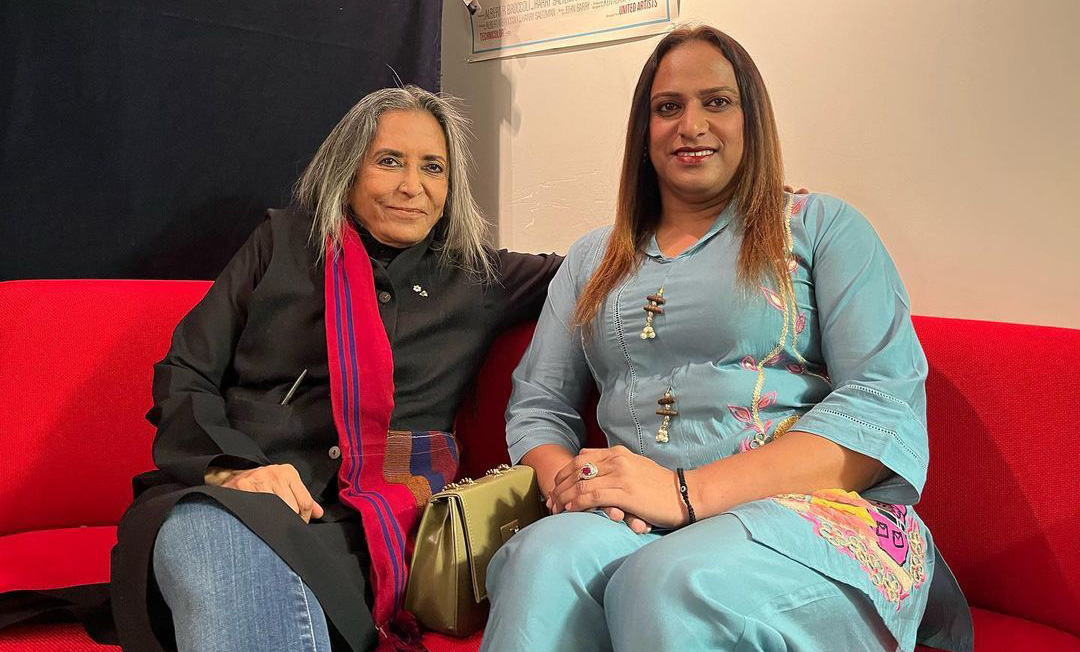Canadian filmmaker Deepa Mehta has been a huge part of changing the Canadian film landscape with features like Fire and Water. And she is continuing to challenge the landscape and make films that are based on merit, and not just token stories.
Her latest TIFF documentary, I Am Sirat is a collaboration with Sirat Taneja, a trans woman from India who documents her dual existence on a smartphone.
Taneja works at the Government of India office and has a network of supportive friends in and out of New Delhi’s queer community. But at home, Taneja has to pretend to be a dutiful son as her mother can’t accept her trans daughter. The duality of her existence is captured authentically on screen.
Mehta said she’s learned so much from Taneja’s unwavering fearlessness and optimism. Taneja’s hope for the documentary is simple: she wants her mother’s acceptance. “Everyone has dreams, and I have dreams too,” she said.
The RepresentASIAN Project sat down with Mehta and Taneja to discuss how Mehta compassionately captured Taneja’s journey with ‘I Am Sirat.’
How did you two meet each other, and how did this collaboration come to be?
Deepa Mehta: We met each other four years ago. I was directing a film in India in Delhi for Netflix, and Sirat was one of the actors in it, and we really got along. I do very intensive cinema workshops, so while we were doing a week’s workshop, Sirat and I really got to know each other. My workshops aren’t about what lines; it’s about character, so we really explored character. We liked each other and we’ve been in touch for four years.
In November, I was in Delhi, and Sirat came to see me. She was telling me about her experience in the community, and her mother was unwell in the hospital, and that’s why she left. I said, “Oh my god, this is so interesting, Sirat. How will I write it? Let me just see if I can write it,” and she said, “Why don’t you record it instead of writing it?” That’s how it all started. I didn’t even know how to do it properly, and Sirat taught me. She said this is what you can press. And then I think two days later [Sirat] said said…tell her what you said, Sirat…
Sirat Taneja: I called Deepa ma’am, and said, “Can you do me a favour? Can you do a film about myself? And she said, “Why?” And I said, “I want to make a film because of the double life I’m leading — outside as a woman and at home as a man. I want my mom to see it and accept me. And show society who I am.” My main motive is that my mother will see this.
Sirat, what was it like working with Deepa?
Sirat: It didn’t feel like work at all. We collaborated on it. She didn’t direct me on what I should do. Whatever was in my heart, I said it on camera.
“[Trans people] are not any different. We are just like you. We don’t have horns or four legs. I have two hands, legs just like you, so why am I different? Everyone has dreams, and I have dreams too.”
– Sirat Taneja
Why shoot the documentary on a smartphone?
Mehta: It’s because it gives you freedom. It gives you intimacy. We aren’t there with the whole crew. You know, doing lighting, sound, camerawork. It’s Sirat’s film. It’s her narrative. She controls it. So for her to say, ‘I’m ready’ to a group of people is ridiculous. It actually stops her from being herself. I thought that, and she thought so too. And so the freedom of being able for you to document what you want to do without the crew felt very important.
What was the goal or purpose when you were making the doc?
Mehta: There was no intention when we were recording that it’s going to be at TIFF, or it’s going to any festival. I hadn’t even thought about CBC at all, until much later. We were just recording her. She was recording her life, and I was recording her telling her life. What she wanted the world to see was that she is a human being who has problems like everybody else. What I love about Sirat is she’s fearless. She is such an optimist. I would collapse under that kind of dual existence: being a man for your mother and being a woman, who she is for the rest of the world. But look at her optimism. She’s so hopeful. I learned so much from Sirat during this, and I think, then you learned from me. I love you very much [Sirat]. She’s a very, very, very hopeful person. We need hope in our lives.
“What she wanted the world to see was that [Sirat] is a human being who has problems like everybody else.”
– Deepa Mehta
You’ve been working in the industry for 25 years, so when it comes to representation and diversity in Canadian film, what have you seen has changed?
Mehta: It was like 25 years ago when Fire, Water, Earth, Funny Boy and Bollywood, Hollywood. That’s all about our Asian stories. I feel what’s fantastic is that there’s this new group of really talented directors who want to tell their stories, which are rooted in where they come from. That is so important, but it’s also about merit. It’s not token stories. And you know, when you think of Zarrar [Kahn], or you think of Fawzia [Mirza], these brilliant young… I’m so proud of these kids, not kids. I’m sorry, guys. This is mind-blowing. So it can’t be about token.
What are you trying to explore with your work as a filmmaker?
Mehta: I hope that from every project that I do, I’m curious about it. That’s what curiosity on a humanitarian level drives me because these are questions whether it’s about race, whether it’s about misogyny, whether it’s about patriarchy, whether it’s about gender choice.
“What I love about Sirat is she’s fearless. She is such an optimist. I would collapse under that kind of dual existence: being a man for your mother and being a woman, who she is for the rest of the world. But look at her optimism. She’s so hopeful. I learned so much from Sirat during this.”
– Deepa Mehta
What’s the hope for you, Sirat?
Sirat: I hope people watch and understand how I’m living my life and support me. I pray my mother accepts me because you can’t change anyone or their thinking. But I have hope. [Trans people] are not any different. We are just like you. We don’t have horns or four legs. I have two hands, legs just like you, so why am I different? Everyone has dreams, and I have dreams too.
This interview has been condensed and edited for clarity.
Like this post? Follow The RepresentASIAN Project on Instagram, TikTok and YouTube to keep updated on the latest content.











